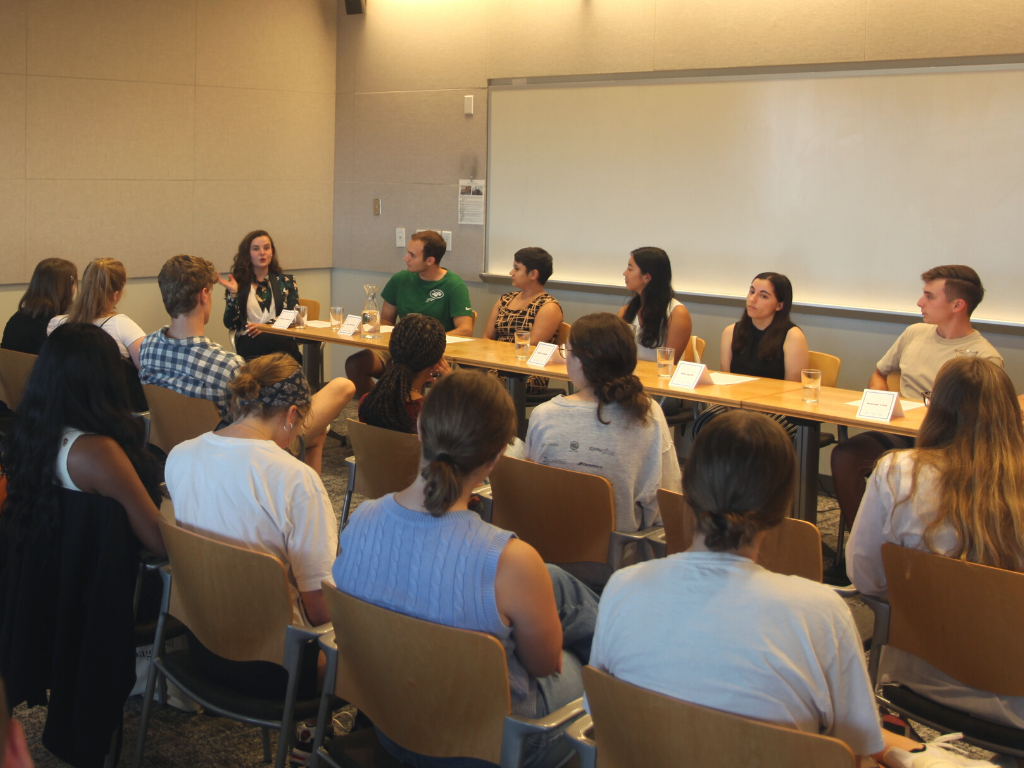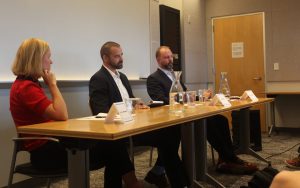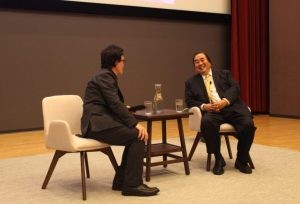Students connected with alumni and leading experts throughout the week—now an annual tradition of UNC’s Diplomacy Initiative—to explore careers in global problem-solving.

How do you get to Washington, D.C. from Chapel Hill? Carolina students want to know, and they’re hungry for guidance from other students, faculty and experienced practitioners who’ve made the journey and are now working in national security, foreign affairs and diplomacy. This year’s Diplomacy Week, October 2-6, shed light on that question and others—on topics ranging from resume length to security clearances to U.S. foreign policy. For the 565 UNC students who joined in the week’s events, the distance to D.C just got shorter.
“I have really loved getting to explore diplomacy-related career paths during Diplomacy Week,” said Toni Winiker, a global studies and peace, war and defense double major. “Furthering connections with people in the field and hearing different perspectives on global issues has been incredibly advantageous, and I am so grateful to have these opportunities through UNC.”
Diplomacy Week is one part of Carolina’s growing Diplomacy Initiative, which expands opportunities for Carolina students and faculty to learn, teach and apply skills used by diplomats in solving global challenges. Led by Barbara Stephenson, vice provost for global affairs and former U.S. ambassador, the Diplomacy Initiative helps Carolina deliver on the Global Guarantee, the university’s promise that a global education is available to every Tar Heel.
“What our students learn here at Carolina—through global coursework in public policy; peace, war and defense; languages; the study of world regions; and more—sets a solid foundation for their future careers. During Diplomacy Week, we give them first-hand exposure to experts and practitioners. They make lasting professional connections. And they gain the confidence needed to take their next steps in becoming a new generation of global leaders,” said Stephenson.
This year’s Diplomacy Week included a student panel on internships and networking in D.C., a Carolina alumni panel on careers in national security and a keynote by one of the United States’ leading human rights lawyers.
Student panel: Opportunities and careers in D.C.
Students who participated in the Honors Seminar on Public Policy and Global Affairs in Washington and others who joined the Diplomacy Initiative’s Washington Week offered insights on professional networking and finding internships in D.C.
Through both D.C.-based opportunities, students said, they were able to apply skills and lessons from their UNC classes to the real world, working directly with industry professionals and connecting with the extensive Carolina alumni network in Washington.
“It was so impactful to be in D.C. for a week, to be at the center of these global issues, to be in this environment where there are so many factors to consider and so many demands,” said Brenner Cobb, who participated in Washington Week.
Other students said that by visiting federal agencies, think tanks and non-governmental organizations during Washington Week, they gained a better sense of where they might want to work someday after graduation.
“D.C. is a learning city in nature,” said Kathryn Haenni, who completed the honors seminar. “They really do make things accessible for you.”
One of the biggest takeaways for students who spent time in D.C. was the vast network of Carolina alumni there to support and guide them. They saw how interconnected the field of global affairs is with the city and how many Tar Heels are a part of it.

Alumni panel: Careers in national security
Two Carolina alumni, Ned Kelly ’05 and Matt Hasty ’04—both senior intelligence officers at the Defense Intelligence Agency (DIA)—talked openly about what it’s like to work in national security and intelligence. During a standing-room-only panel discussion, the committed Tar Heels shared advice on leveraging a Carolina education to secure competitive jobs in federal service.
“Uniquely for Carolina, you see authenticity and resiliency that makes Tar Heels exceptional intelligence officers,” Hasty said. “There’s a diversity in experience and thought that sets Carolina students apart.”
Throughout the week, Kelly and Hasty also met individually with students to review their resumes, discuss career goals and offer feedback.
Keynote: International law and the Ukraine-Russia crisis
Diplomacy Week culminated in a public lecture by Harold Koh, Sterling Professor of International Law at Yale Law School, who argued on behalf of Ukraine at the International Court of Justice in 2022.
Koh spoke to a packed auditorium of Carolina students and community members on the “battle between Russia’s past and Ukraine’s future.”
“This war is about principles for the 21st century and the possibility of a democratic future under the rule of law,” said Koh. “The tragedy we are all watching in Kyiv and [elsewhere] is precisely what our modern international legal system was designed to prevent. Putin’s short game is force; our long game is law.”

Koh’s speech illustrated the skills used by diplomats to find common ground, analyze information and communicate persuasively—skills the Diplomacy Initiative is helping Carolina students to gain. Many students stayed behind to ask Koh questions about the war in Ukraine and about his career journey.
Dan Stompel ’25, a peace, war and defense major, is originally from St. Petersburg, Russia, and said he was inspired by Koh’s presentation.
“I believe there should be more of these events happening,” said Stompel. “This is exactly what I want to be doing in life, and listening to Harold Koh speak was extremely motivating. It makes me want to pursue diplomacy and foreign relations that much more.”
The Carolina Forum for Education and Diplomacy co-hosted Koh’s visit, and the group’s president, Atharv Kripak, said, “I think that it’s really important for UNC students to understand what’s going on in the world and have access to these esteemed officials in the field, especially if they are interested in global affairs, diplomacy and even business. I think that everyone has an interest in this topic and can gain something from being here.”
As a part of the Diplomacy Initiative, UNC Global Affairs also hosted Ambassador Charles Ries, one of the State Department’s most noted experts on the formation of the European Union, for a diplomatic discussion on why Brexit matters and the future of transatlantic relations on October 25.
By Madison Van Horn and Maggie Mcintyre ’25, UNC Global
